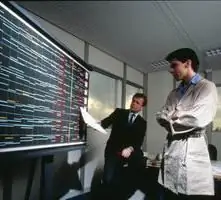2026 Author: Howard Calhoun | calhoun@techconfronts.com. Last modified: 2025-01-24 13:10:41
In any organization, personnel policy is the pillar on which its normal functioning rests.

This concept includes the rules, methods, principles and techniques of working with employees, drawn up in a system and formulated in a set of documents. The more conscious the management strategy, the better each member of the team understands it, the more successfully each employee and, consequently, the enterprise as a whole functions. Personnel policy is not an end in itself. It is designed to ensure the timely influx of labor, its balance in accordance with the ultimate goals of the enterprise, its needs and place in the market. Today there are firms that do not have a documented strategic base. However, the absence of clearly formulated documents does not mean that personnel policy is a non-existent factor. It may not be fully realized by management, wrong or unproductive, but it always exists.
The system of personnel policy, its construction

The creation of a personnel concept begins with a study of the tasks of the enterprise, its needs, the potential of leadership as a process, an analysis of the strengths and weaknesses of the organizational strategy. A competent personnel policy is a system that can be built only by taking into account the factors (external and internal) that affect the enterprise. Some of them can be changed by guiding efforts, others are not amenable to change. Internal factors:
• The final goals facing the production (organization, etc.).
• Leadership style. Authoritarian, liberal and democratic leadership requires specialists of different classes and levels of training.
• Management style. Centralized or decentralized management implies the presence of specialists of different profiles, different levels of training.
• Personnel of the organization. It is understood that the effective management of personnel policy depends on the correct assessment of employees, their capabilities, and the competent distribution of production responsibilities.

All internal factors can be corrected within the organization. Someone is powerless to change external circumstances, so it is especially important to take them into account when building personnel management. Consider the following:
• The situation taking place in the market, its development trends. The state of education in the country, the direction of its development, the demographic situation, the social characteristics of the time dictate their own conditions for the establishment of one ora different system of personnel policy.
• Constant progress that requires an influx of higher-level specialists or retraining of staff.
• Legal environment and constantly updated regulations. The activities of any enterprise in any field must absolutely comply with the legal framework of the state.
Main directions of personnel policy:
• Selection and placement of employees.
• Preparation of a reserve for working speci alties and management.
• Evaluation, certification and development of personnel.
Changing the policy in the selection of personnel allows you to multiply the success of the organization.
Recommended:
Personnel policy and personnel strategy: concept, types and role in enterprise development

Now the personnel management function is moving to a new qualitative level. Now the emphasis is not on the execution of direct instructions from line management, but on a holistic, independent, ordered system, which contributes to improving efficiency and achieving the goals of the organization. And this is where HR policy and HR strategy help
Production plan, or Vector of success of any enterprise

In fact, the production plan is the basis of all other sections. The information contained here, its logical correspondence with economic calculations and calculations plays a decisive role in making a decision on project financing
Personnel development is the key to success

Personnel development is a set of interrelated activities aimed at developing a recruitment strategy, planning for staff needs, managing career growth and organizing their training and adaptation process. In addition, such actions include the formation of work etiquette and organizational culture
Accounting policy for the purposes of tax accounting: the formation of an enterprise accounting policy

A document that defines an accounting policy for tax accounting purposes is similar to a document drawn up according to accounting rules in accounting. It is used for tax purposes. It is much more difficult to draw up it due to the fact that there are no clear instructions and recommendations for its development in the law
The basis of success is skillful time management

The main value of every person is, oddly enough, time. Despite the fact that now there are many devices that allow us to save it, we often forget about it, do unnecessary work and, as a result, do not have time for anything. Effective time management is a skill that is not for everyone. So, for example, if you procrastinate and often get distracted by unimportant things, you should learn time management

